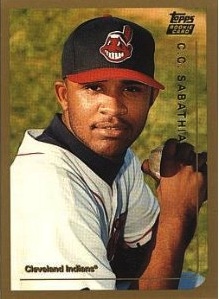The packs for the 1999 SP Signature Edition were $20 and only available at Hobby Shops. Each contained three cards. Two base cards and one autographed card. Now, there were some really nice cards in this set that are really cool and worth owning. However, in a mega-autograph set there are also plenty of cards that are painful to see inside a pack of $20 cards.
One of my big pluses in owning cards from this set is the design. The autographs are all on card and the card themselves feature a white background which showed the blue ink autographs very well. As far as the autographs go I break them into three categories. Lets take a look at a few cards from the set using a few Orioles. Just picked a team.
1999 SP Signature Edition Ivan Coffie
1. Common Cards- Every mega-autograph set has tons of filler cards like this Ivan Coffie. It stinks to buy a per pack autograph, spend good money, and pull a card that sells on Ebay for $2 on a really good day. I often look at the common cards in mega-autograph sets from this perspective: Collect your favorite team and fill in your autograph collection. For example, one of my favorite Cardinals teams was the 1996 National League Central Champions. It was LaRussa's first year, Ray Lankford and several other personal favorites were on the team, and they came within a game of the World Series. It was also the same year the Leaf Signature set was released and I was able to get a lot of the team in the set with a certified autograph. They won't all fit in the picture, but here's a sampling.
1996 Leaf Signature Cardinals Autographs: John Mabry, Tom Pagnozzi, Mike Gallego, and Gary Gaetti
Love the Gary Gaetti card the most out of this lot.
1999 SP Signature Edition Albert Belle Autograph
2. Current Stars- In 1999 Albert Belle was fading at the end of his career. His cards were still pretty desirable and held their value pretty well at the time. Even to this day his cards have a bit of following and are never super cheap. If you scour the internet and local card shops you will find that Albert Belle has a few autographs floating around out there. Especially recent autographs. At the time of this product release however there were very few floating around. If you wanted an Albert Belle autograph, this was your best bet. Most mega-autograph sets have a few cards like this. Ron Gant is another big one from this set with a similar story.
1999 SP Signature Edition Frank Robinson Autograph
3. Hall of Famers-My third category is what most people want to find in their one per autograph packs, but the odds are always difficult on these cards. Looking at my Frank Robinson, it is probably one of the cheaper Hall of Fame autographs in this set. In fact, some people would argue that a card like Frank barely covers the cost of the pack on a good day on Ebay. I disagree. While it is probably just in the $20 range, covering the pack cost, the cards in the 1999 SP Signature Edition are on card. For my collection I would much rather own a slightly less expensive on card autograph then a limited print number, high end, sticker autograph.
Like the 1999 SP Signature Edition? Not in my 30 Year Top 50 is the By The Letter insert in SP Authentic sets. If you have been following my countdown you'll notice that the Not in the Top 50 and the in the Top 50 set are often tied together somehow. Today, I am straying a little bit. Upper Deck has released some other uber-autograph sets, but this thread is supposed to be about the highlights.
I could have easily focused this section on one of the Ultimate Signature sets, but the By The Letter Autographs deserve a little bit of love. I miss them so very much and while Topps has duplicated them into their own creation:
2010 Topps Finest Buster Posey Letter Patch Autograph
They aren't quite the same as the original Upper Deck product. The By The Letter Autograph concept started in the 2006 SP Authentic set. The cards were an instant smash hit. The concept of course was to collect all the letter patches of a player to spell out their name. Here's how they started out:
2006 SP Authentic Matt Holliday By The Letter Autograph
Over the next several years the cards changed very little in concept and design, but still offered collectors a cool product to chase every year. Whether you were collecting players from your favorite team:
2009 SP Authentic By The Letter David Freese Autograph
Or you just ran into a cool inexpensive card of an average player.
2008 SP Authentic By The Letter Edwin Encarnacion Autograph
The By The Letter Autographs are a set that I strongly considered bundling together and putting on my countdown.















SBK!~~60_3.JPG)
























BQYccjfDZw~~60_35.jpg)





